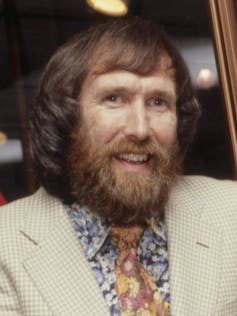“Cult” is often indiscriminately applied to film and television. In Cult Movies (1981), film critic Danny Peary argued that it should be reserved for “special films which for one reason or another have been taken to heart by segments of the movie audience, cherished, protected, and most of all, enthusiastically championed”.
Subsequent academic and popular debates suggest it is a malleable label. But notwithstanding its elasticity, not all films can claim cult status. Despite their era, genre or industry, cult films stand out because audiences have a special, lasting connection with them that goes above and beyond normal patterns of consumption.
One such example is The Muppet Christmas Carol, which turned 30 in 2022.
The ritualistic rewatching of certain films during the holidays, combined with the strong sense of nostalgia (both historical and personal) that circulates during the festive season, fosters a lasting connection between movie and viewer that can elevate films to cult status.
The special combination of a treasured story and beloved characters from a much-loved and much-missed creator makes for particularly heady nostalgia in The Muppet Christmas Carol.
It’s a nostalgia that continues to lure audiences long after an initially disappointing box office performance, released in a period still under the shadow of Jim Henson’s untimely death.
A surprisingly faithful adaptation
Among the many screen adaptations of Charles Dickens’s A Christmas Carol, The Muppet Christmas Carol is unique. Not least because it casts Gonzo, the unclassifiable “whatever” as Dickens and Rizzo the Rat (playing himself) as his grounded, wisecracking sidekick.
It draws on yearnings for snowy Victorian Christmases and expertly balances humour, dread and sentimentality.
As Kermit himself tells us in a behind the scenes interview for Entertainment Tonight, the team tried to stay faithful to the original. The only difference, he argues, is that “there’s lots of frogs and pigs and chickens and rats playing the main parts. I think Charles would have liked it that way.”
In the tradition of Jim Henson productions (including The Muppet Show but also big screen outings The Dark Crystal, 1982, and Labyrinth, 1986) the set is brought to life by a menagerie of colourful creatures and anthropomorphised plant life.
Popular Muppet characters bring their own special nostalgia for physical puppetry techniques in an age of digital technologies. They also call back to memories of traditional family entertainment. Fozzy Bear, Miss Piggy, Animal, the Swedish Chef, and Statler and Waldorf (perfectly cast as Marley and Marley, Scrooge’s dead partners) all make an appearance.
Michael Caine, no stranger to cult by way of Get Carter (1972), is serious and gruff as Scrooge, seemingly oblivious to the Muppet mayhem around him.
Director Brian Henson has said that Caine only agreed to take the role if he could play it like he was working with the Royal Shakespeare Company.
Why is The Muppet Christmas Carol so enduring?
In celebrating the 30th anniversary, many fans point to their personal connections to the film. They talk about poignant family viewing experiences and the film’s cross generational appeal.
Adding to its cult status, the film even has a “lost” song – a ballad called When Love Is Gone that was cut from the theatrical release on the recommendation of then Disney Studios chairman Jeffrey Katzenberg. It has been restored for the anniversary streaming on Disney+.
There are also opportunities to experience Miles Goodman’s score performed live with screenings of the film in cinemas across the UK. Brian Henson has suggested that the enthusiasm for the film in the UK home entertainment market has helped to establish its lasting legacy.
The enduring popularity of the film also demonstrates a continuing affection for Jim Henson that has been especially pronounced in the UK.
It’s a bond enhanced by his personal and professional ties to the capital via The London Creature Shop (his special effects house and puppet workshop) which operated in the city between 1979 and 2005. Marking his significance, an English Heritage Blue Plaque was erected in 2021 at his former Hampstead home.
Drawing upon several critical perspectives on seasonal cult classics, fan studies scholar Renee Middlemost concluded that something peculiar happens when we embrace our favourite Christmas movies.
“By suspending one’s typical tastes and critiques,” she argues, “cynicism can be transcended in favour of ritual and social bonding. In this way, the ritual bonding over these films functions as an extension of the season itself.”
Or, as put more simply in lyrics from The Muppet Christmas Carol itself: “Wherever you find love, it feels like Christmas.”![]()
Andrea Wright, Senior Lecturer in Teaching and Learning Development, Edge Hill University
This article is republished from The Conversation under a Creative Commons license. Read the original article.

Comments